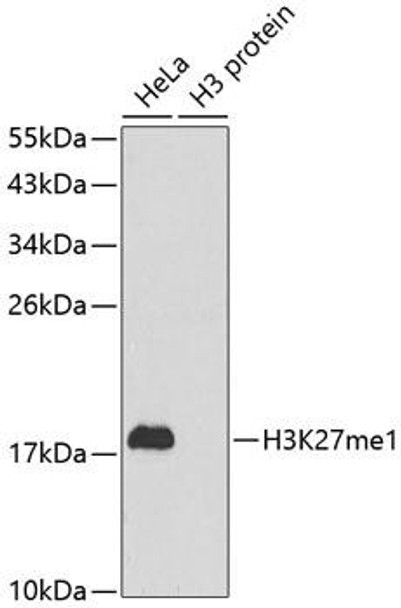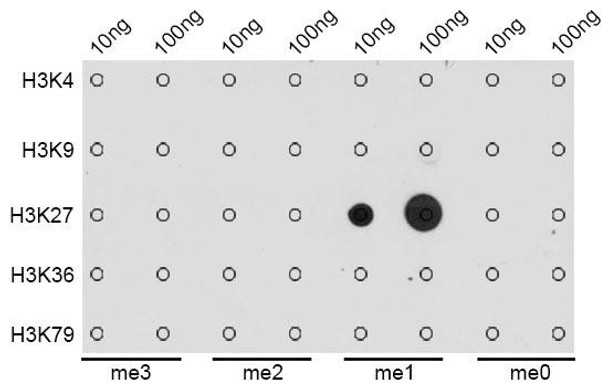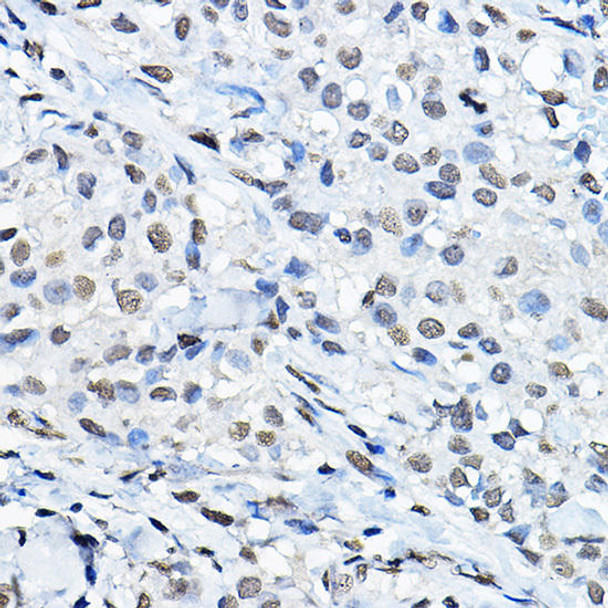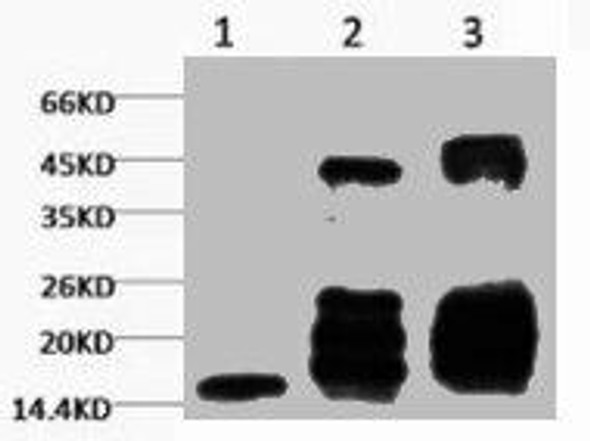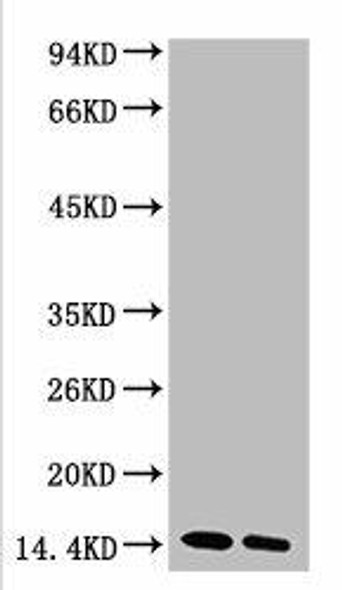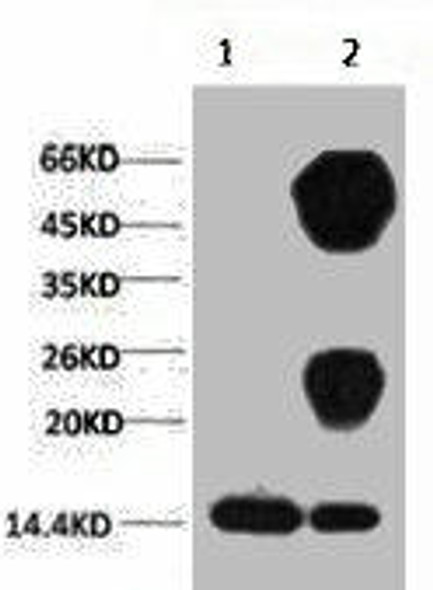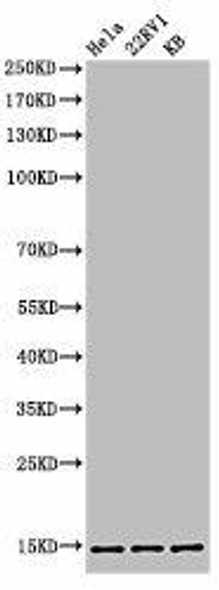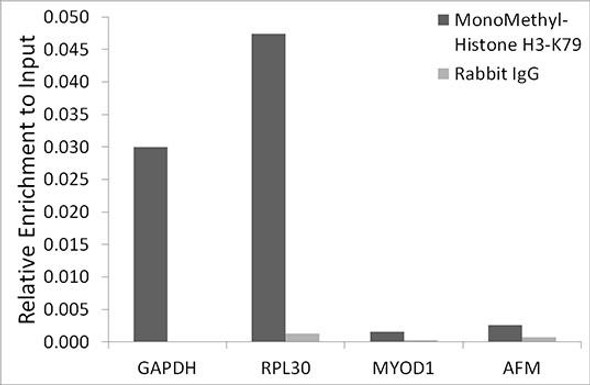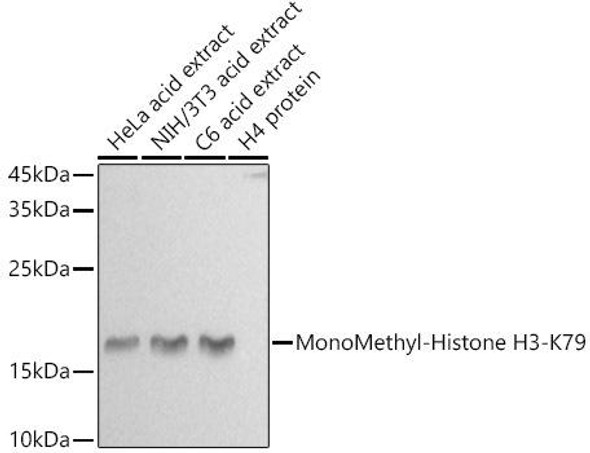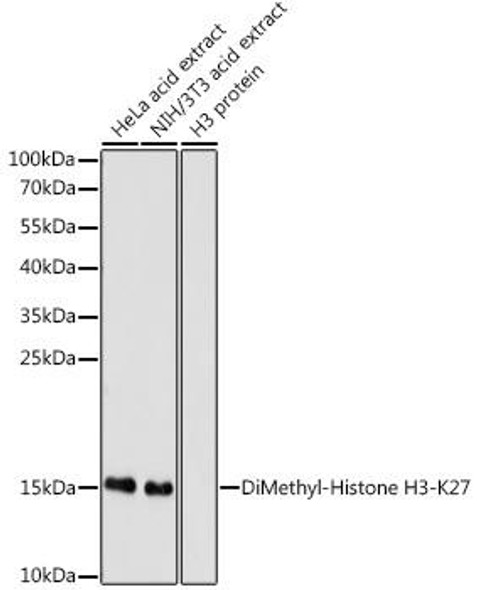Description
Anti-MonoMethyl-Histone H3-K27 Antibody (CAB2361)
The Monomethyl Histone H3 (K27) Polyclonal Antibody (CAB2361) is a valuable tool for researchers studying epigenetic modifications, specifically the monomethylation of histone H3 at lysine 27. This antibody, produced in rabbits, is highly specific to human samples and is validated for use in techniques such as Western blot and immunohistochemistry.Histone H3 lysine 27 monomethylation is a key epigenetic mark involved in gene regulation and chromatin structure, affecting processes like transcriptional activation and repression. Dysregulation of this modification has been linked to various diseases, including cancer and developmental disorders.
By targeting this modification, researchers can gain insights into gene expression patterns and biological pathways related to disease development and progression.With its high specificity and sensitivity, the Monomethyl Histone H3 (K27) Polyclonal Antibody (CAB2361) is an essential tool for investigators in the fields of epigenetics, cancer biology, and developmental biology. By enabling the detection and analysis of histone H3 lysine 27 monomethylation, this antibody facilitates a deeper understanding of the role of epigenetic modifications in health and disease.
| Antibody Name: | Anti-MonoMethyl-Histone H3-K27 Antibody |
| Antibody SKU: | CAB2361 |
| Antibody Size: | 20uL, 50uL, 100uL |
| Application: | WB IHC IF IP ChIP ChIPseq |
| Reactivity: | Human, Mouse, Rat, Other (Wide Range) |
| Host Species: | Rabbit |
| Immunogen: | A synthetic methylated peptide corresponding to residues surrounding K27 of human histone H3 |
| Application: | WB IHC IF IP ChIP ChIPseq |
| Recommended Dilution: | WB 1:500 - 1:2000 IHC 1:50 - 1:200 IF 1:50 - 1:200 IP 1:50 - 1:200 ChIP 1:20 - 1:100 ChIPseq 1:20 - 1:100 |
| Reactivity: | Human, Mouse, Rat, Other (Wide Range) |
| Positive Samples: | HeLa, NIH/3T3, C6 |
| Immunogen: | A synthetic methylated peptide corresponding to residues surrounding K27 of human histone H3 |
| Purification Method: | Affinity purification |
| Storage Buffer: | Store at -20'C. Avoid freeze / thaw cycles. Buffer: PBS with 0.02% sodium azide, 50% glycerol, pH7.3. |
| Isotype: | IgG |
| Sequence: | Email for sequence |
| Gene ID: | 8350 |
| Uniprot: | P68431 |
| Cellular Location: | Chromosome, Nucleus |
| Calculated MW: | 15kDa |
| Observed MW: | 17KDa |
| Synonyms: | H3.4, H3/g, H3FT, H3t, HIST3H3, Histone H3, HIST1H3A |
| Background: | Histones are basic nuclear proteins that are responsible for the nucleosome structure of the chromosomal fiber in eukaryotes. Nucleosomes consist of approximately 146 bp of DNA wrapped around a histone octamer composed of pairs of each of the four core histones (H2A, H2B, H3, and H4). The chromatin fiber is further compacted through the interaction of a linker histone, H1, with the DNA between the nucleosomes to form higher order chromatin structures. This gene is intronless and encodes a replication-dependent histone that is a member of the histone H3 family. Transcripts from this gene lack polyA tails; instead, they contain a palindromic termination element. This gene is located separately from the other H3 genes that are in the histone gene cluster on chromosome 6p22-p21.3. |
| UniProt Protein Function: | H3: Core component of nucleosome. Nucleosomes wrap and compact DNA into chromatin, limiting DNA accessibility to the cellular machineries which require DNA as a template. Histones thereby play a central role in transcription regulation, DNA repair, DNA replication and chromosomal stability. DNA accessibility is regulated via a complex set of post-translational modifications of histones, also called histone code, and nucleosome remodeling. The nucleosome is a histone octamer containing two molecules each of H2A, H2B, H3 and H4 assembled in one H3-H4 heterotetramer and two H2A-H2B heterodimers. The octamer wraps approximately 147 bp of DNA. Belongs to the histone H3 family. |
| UniProt Protein Details: | Protein type:DNA-binding Chromosomal Location of Human Ortholog: 6p22.2 Cellular Component: extracellular region; membrane; nuclear chromosome; nuclear chromosome, telomeric region; nucleoplasm; nucleosome; nucleus; protein complex Molecular Function:cadherin binding; histone binding; protein binding Biological Process: blood coagulation; cellular protein metabolic process; chromatin silencing at rDNA; DNA replication-dependent nucleosome assembly; establishment and/or maintenance of chromatin architecture; negative regulation of gene expression, epigenetic; nucleosome assembly; positive regulation of gene expression, epigenetic; protein heterotetramerization; RNA-mediated gene silencing; telomere organization and biogenesis |
| NCBI Summary: | Histones are basic nuclear proteins that are responsible for the nucleosome structure of the chromosomal fiber in eukaryotes. Two molecules of each of the four core histones (H2A, H2B, H3, and H4) form an octamer, around which approximately 146 bp of DNA is wrapped in repeating units, called nucleosomes. The linker histone, H1, interacts with linker DNA between nucleosomes and functions in the compaction of chromatin into higher order structures. This gene is intronless and encodes a replication-dependent histone that is a member of the histone H3 family. Transcripts from this gene lack polyA tails but instead contain a palindromic termination element. This gene is found in the small histone gene cluster on chromosome 6p22-p21.3. [provided by RefSeq, Aug 2015] |
| UniProt Code: | P68431 |
| NCBI GenInfo Identifier: | 55977055 |
| NCBI Gene ID: | 8357 |
| NCBI Accession: | P68431.2 |
| UniProt Secondary Accession: | P68431,P02295, P02296, P16106, Q6ISV8, Q6NWP8, Q6NWP9 Q6NXU4, Q71DJ3, Q93081, A0PJT7, A5PLR1, |
| UniProt Related Accession: | P68431 |
| Molecular Weight: | 15kDa |
| NCBI Full Name: | Histone H3.1 |
| NCBI Synonym Full Names: | histone cluster 1 H3 family member h |
| NCBI Official Symbol: | HIST1H3HÂ Â |
| NCBI Official Synonym Symbols: | H3/k; H3FK; H3F1KÂ Â |
| NCBI Protein Information: | histone H3.1 |
| UniProt Protein Name: | Histone H3.1 |
| UniProt Synonym Protein Names: | Histone H3/a; Histone H3/b; Histone H3/c; Histone H3/d; Histone H3/f; Histone H3/h; Histone H3/i; Histone H3/j; Histone H3/k; Histone H3/l |
| UniProt Gene Name: | HIST1H3AÂ Â |
 | Western blot analysis of extracts of various cell lines, using MonoMethyl-Histone H3-K27 antibody at 1:1000 dilution. Secondary antibody: HRP Goat Anti-Rabbit IgG (H+L) at 1:10000 dilution. Lysates/proteins: 25ug per lane. Blocking buffer: 3% nonfat dry milk in TBST. Detection: ECL Enhanced Kit. Exposure time: 180s. |
 | Dot-blot analysis of all sorts of methylation peptides using MonoMethyl-Histone H3-K27 antibody (A2361). |
 | Immunohistochemistry of paraffin-embedded rat kidney using MonoMethyl-Histone H3-K27 Rabbit pAb at dilution of 1:100 (40x lens). Perform high pressure antigen retrieval with 10 mM citrate buffer pH 6. 0 before commencing with IHC staining protocol. |
 | Immunohistochemistry of paraffin-embedded human breast cancer using MonoMethyl-Histone H3-K27 Rabbit pAb at dilution of 1:100 (40x lens). Perform high pressure antigen retrieval with 10 mM citrate buffer pH 6. 0 before commencing with IHC staining protocol. |
 | Immunohistochemistry of paraffin-embedded mouse brain using MonoMethyl-Histone H3-K27 Rabbit pAb at dilution of 1:100 (40x lens). Perform high pressure antigen retrieval with 10 mM citrate buffer pH 6. 0 before commencing with IHC staining protocol. |
 | Chromatin immunoprecipitation analysis of extracts of 293T cells, using MonoMethyl-Histone H3-K27 antibody and rabbit IgG. P1 and P2 were located on ANO2 gene. The amount of immunoprecipitated DNA was checked by quantitative PCR. Histogram was constructed by the ratios of the immunoprecipitated DNA to the input. |

